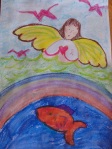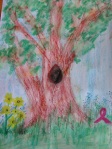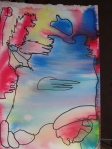
- Fairangel (Lili’s title)



I hang up the phone and stare at the large white board in my writing room. I read my deadlines, review my writing goals, realize that time is passing along with windows of opportunity to submit manuscripts to editors and agents I met at recent conferences. Do I stay and meet my deadlines? Do I abandon my job without notice and go to Idaho; help my sister and her young twins get through the surgery?
There is only one choice.
I book a flight on Delta. Pack my suitcase. Fill every inch of my computer bag with my laptop, camera, books and two novels I am revising. On the plane I read Catalyst by Laurie Halse Anderson. I need to sleep, but her brilliant writing keeps me turning the pages. I temporarily forget where I am going and why.
The second flight is delayed. I walk through terminal C in Chicago. Terminal B. Terminal C. I can’t decide what to buy for food. I wait in line at Starbucks and when my turn is next, I walk off. I wander. The flight is called. I buy a bottle of water and run.
I realize that somewhere between Connecticut and Chicago I lost my appetite. Once I arrive in Idaho, I realize that somewhere between Chicago and Boise, Idaho, I lost my rhythm and my words. I lost the connection to my characters and a connection to myself.
In Idaho, I quickly learn my new rhythm, which is maintaining routines and normalcy: Laundry. Dishes. Hugging. Reading. Going for walks with my eight-year-old nieces. Listening to their fears. Answering phone calls. Answering the door. Finding places for all the flower arrangements. Walking the dog. Everything but my writing.
My sister comes home from the hospital. The girls are at school. I pour a cup of coffee and sit on their porch on a red Adirondack chair. I can see the mountains of Idaho ahead. The air is hot. 101 degrees. I sit and sit . . . and sit. My fingers stay frozen on my keypad. My wrists are numb. My words gone. I go into the house and check on my sleeping sister. I drink a glass of water. Stare at the clock. I let the dog out. Wish for a cure for cancer. Load the dishwasher. I let the dog in. I fold laundry. Read medical brochures. I go back outside, turn off my laptop, and lay it on the bed. I close the door and walk away. Drink a glass of orange juice. Look at the clock. Put laundry away. Organize the girls’ books. Wipe the counter. Cut up the fruit for snack. Write a grocery list. We need milk and chicken. We need laughter to fill up the house. We need music to lull our fears. We need to understand why and how and when and everything else about cancer. Everything we never wanted to know.
And so my eight-year-old nieces and I paint. Why? Because we have to. Because the words are gone. Because we need to stab our paint brushes into the remainders of a paint box. Because the sound of chalk brushing across an empty sheet of paper is soothing. Because allowing your hands to sweep across the page is like riding a horse without fear. Without a saddle. Just so you can feel the wind against your hair. Colors become shapes. Angry globs of red. Tight dots in black. Yellow splashes of confusion. Sofi splashes water on her paper. Over and over. Lili’s first painting is all about the shades of pink.
We do not talk. Side by side, the three of us paint, until our hands speak for our hearts. And in doing so, Sofi and Lili begin to express their fears. For myself, the activity of painting shows me there is a pathway back to my words. It is crowded with trees and overgrown bushes; feelings and emotions which spin constantly like a non-stop ferris wheel. I coat a sheet of paper with blue and smile. The paint brush will trim the overgrown bushes and trees. Little by little, clip by clip, I will find my way back.
I know my characters are waiting patiently for me.